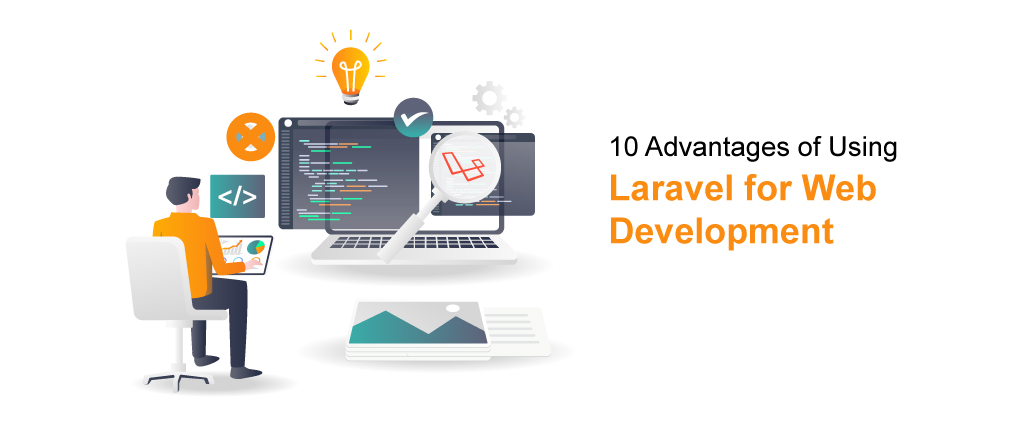10 Advantages of Using Laravel for Web Development

Laravel is among the most widely used PHP web frameworks for creating web applications. It is an open-source framework that has gained immense popularity among web developers due to its simplicity, scalability, and versatility. Laravel follows the Model-View-Controller (MVC) architecture, making it easy to build complex web applications quickly. In this blog post, we will discuss the top 10 advantages of using Laravel for web development.
What is Laravel?
To all those who aren't familiar with themselves with programming dialects, we’ve got you covered. It’s just an issue of time before you become a specialist in this. Okay, so what exactly is Laravel? The most practical PHP framework in the entire family, Laravel is open-source and used to quickly create web applications that are both reliable and scalable. Taylor Otwell, the creator of this web development framework, first unveiled it in 2011 as a replacement for the then-popular PHP framework CodeIgniter. Laravel was created with the goal of enhancing CodeIgniter's security processes with convenient permission and authentication tools. Over the years, there have been enormous improvements in the Laravel framework with a built-in Blade template system, communication queue support, and task automation features. Today, Laravel offers all the tools required to create an amazing website that is current and useful.
Advantages of using Laravel for web development
Modularity and Code Organization:
Laravel is created with a modular framework that enables developers to arrange their code into manageable, reusable modules. By dividing large, complicated projects into smaller, more manageable chunks, this feature facilitates their management. Another logical and orderly method of arranging code is the default directory structure of Laravel.Routing System:
One of Laravel's most potent and adaptable features is its routing system. By employing a straightforward syntax, it enables programmers to handle tricky URL patterns and construct routes. In order to facilitate management and facilitate the development of complicated web applications, the routing system can also bundle routes together.Blade Templating Engine:
Blade, a potent templating engine included with Laravel, enables developers to produce organized templates that are simple to reuse for various components of a web application. The blade comes with a set of syntax that makes it simple to create intricate templates that include conditional statements, loops, and other features.Object-Relational Mapping (ORM):
Object-Relational Mapping (ORM): Eloquent, the ORM provided by Laravel, enables programmers to use object-oriented approaches to interact with databases. Working with databases is made simpler by Eloquent user-friendly API for data manipulation and querying. By using this functionality, developers may concentrate on developing clean, maintainable code rather than writing raw SQL queries.Authentication and Authorization:
A web application may easily add user registration, login, and access control thanks to Laravel's integrated authentication and authorization functionality. These characteristics can be altered to match the particular requirements of a project and aid in ensuring the application's security.Testing:
Laravel offers a framework for testing that makes it simple to create and execute automated tests. This feature guarantees that a web application is operating as expected and aids developers in identifying concerns before they become problems. The testing framework for Laravel also supports many test kinds, such as unit tests, feature tests, and browser tests.Security:
Laravel is constructed with built-in security features like CSRF protection, encryption, and hashing because it was designed with security in mind. These capabilities assist in guarding against widespread security risks including cross-site scripting (XSS), SQL injection, and cross-site request forgery (CSRF) for web applications.Support from the community:
Laravel has a sizable and vibrant community of developers who contribute to the framework, make packages, and help other developers. Laravel benefits from the community's support in staying current and relevant. Online forums, tutorials, and documentation are also useful tools for developers.Rapid Application Development:
Laravel includes code generation, scaffolding, and pre-built authorization making it simpler to build web applications swiftly. For startups and small enterprises that need to quickly launch a web application, this capability is extremely helpful. The quick application development capabilities of Laravel can also help shorten development cycles and lower costs.Integration of Third-Party Libraries:
Laravel is capable of integrating with a variety of third-party libraries, including email services, payment gateways, and social networking APIs. Without having to reinvent the wheel, this capability makes it simpler to add functionality to a web application. By utilizing pre-existing code and solutions, Laravel's connection with third-party libraries can also assist in shortening development time and costs.
